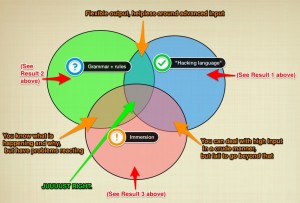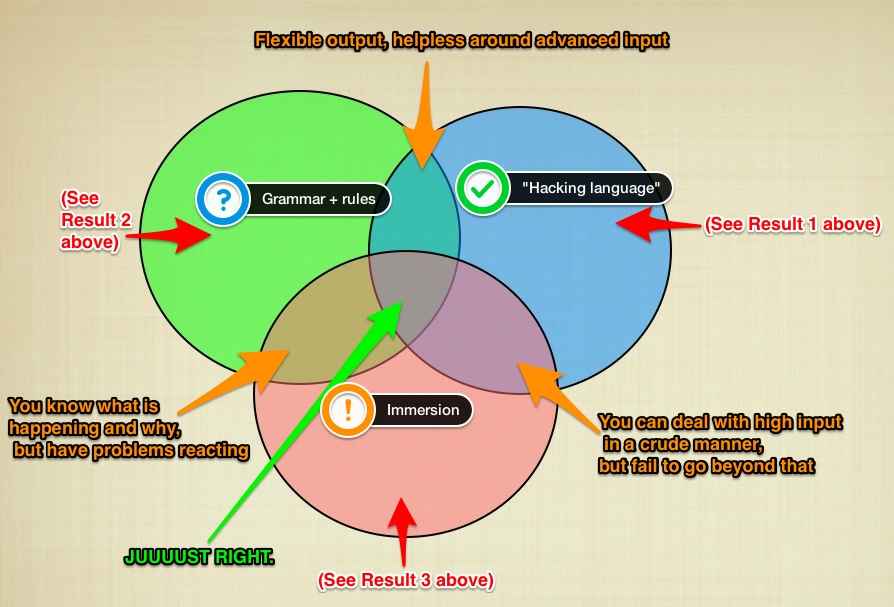 Some time ago, I announced a brave and cunning plan: to learn French in 30 days without spending a penny. All foreign language learners should probably know better – but my anxiety and motivation pushes me on. Here’s a quick update on my French learning methods!
Some time ago, I announced a brave and cunning plan: to learn French in 30 days without spending a penny. All foreign language learners should probably know better – but my anxiety and motivation pushes me on. Here’s a quick update on my French learning methods!
1. Here’s why ready-made language courses fail (3 reasons, pick your own)
Scenario 1: “Let’s make this as simple as possible. You only need a few dozen words to say what you need in most situations. People don’t have time for grammar and they want a foreign language to feel safe. Give them translations. Play some classical music. Slow it down. That will sell.”
Result 1: You learn a few dozen words and phrases in a safe, slow, relaxed environment. And then, on the streets of Marrakech, nothing is slow, safe or relaxed – and everyone refuses to use the phrases you learned! You panic.
Scenario 2: “Okay, okay. Do-over. Let’s give them rules. Rules will help them figure this out. You need to understand the grammar, the rules of the language. From there, you’ll create your own language. Learners are logical beings. They’ll get it. Sell them the method and the solution, not the product.”
Result 2: You know exactly why and how a certain tense is used. Your knowledge of grammar is admirable. It’s just that everyone else seems to be ignoring these rules. Their sentences are ungrammatical, the idioms are a parody of the grammar – and when you occasionally have a conversation that uses the grammar, everyone thinks you talk funny.
Scenario 3: “MERDE! Why won’t these things work?! Do you want to make it hard on yourself? Do you?!? Well, you asked for it. Total immersion. We speak French only. No translations. Whatever you get, you get in French. And we don’t slow down for you. We’re going full hardcore, from day one, with all the speed and slang and it’s going to be just like the real thing. Is that what you wanted? IS IT? HUH?!? IS IT?!?!”
Result 3: You punch your teacher in the face on day three and leave, crying and realising that you paid a lot of money for something you’ll get for free when you visit the country.
2. The gap and the monitor – back to foreign language lacks and theories
We’ve been through this before: you will realize that there is a gap between what you wish you were able to do in a language you’re learning, and what you’re actually able to do. That’s a good thing and should be expected.
As it turns out, this condition has been well researched and discussed. And the discussion matters to anyone who wishes to learn languages better.
Krashen’s input hypothesis: a complicated and multi-layered monster of a theory. Some things will be hard to believe after all the years after they were written. And some others will simply not matter for an average, keen polyglot. Here’s what we need today:
- – There’s a difference between language acquisition and language learning. Acquisition happens unconsciously, it’s hard to plan, predict and understand. Learning happens consciously, and you can plan, measure and prepare for it.
- – What you learn and acquire will be used to monitor what you produce. Once you know the rules for French past tense, you will “check yourself” for errors in past tense when you speak or write.
- – In order to make progress, your input (the things you “take in” in language learning) should be higher than your current level, but not too high. Aim too low and you’re not making progress or challenging yourself. Aim too high, and it’s all “over your head” and cannot be learned or acquired.
3. High input, low output: the gap and the monitor in practice
I’m trying three things out now, pretty intensively: a Memrise course, a Duolingo course and a podcast service. I’m noticing something interesting as I go through these, and I thought I’d share this quickly.
The Memrise course is one of the “language hacking” solutions explained elsewhere. It’s giving me bite-sized chunks that I will use in most situations (like Scenario 1 above), but it’s not challenging at all. This is my “low output.”
Duolingo takes me through vocabulary and grammar in a neat, structured way. It penalizes my mistakes and gives me plenty of chances to modify and experiment with the form. This is like the Scenario 2 above: the grammar and vocabulary is well explained – I learn the rules quickly and consciously – but wouldn’t expect to use the phrase “The calm men are eating oranges” everywhere I go in Morocco 😀
The podcasts are kicking my little French-learning derrière. They are spoken fast, and are aimed at a much higher level than what I’m able to produce currently. I find, however, that I’m able to understand the gist of the conversations – and I’m getting used to people speaking quickly without slowing down for me. This is like the Scenario 3 above, but without crying.
I’m in a sweet spot for now, and only wish I had more time for this. The courses cost nothing (I’m not using the PDF service for the podcasts, assuming that I’ll read very little in Morocco) and complement each other nicely (see diagram above).
4. Over to you: how do your language learning methods fit you?
This is not just a theoretical question. You are sold your language method, and should have the right (as well as the skills) to replace it if it’s not doing well. So think about yours, and let’s have a chat in the comments below if you feel like it!
Wiktor (Vic) Kostrzewski (MA, DELTA) is an author, translator, editor and project manage based in London. When he works, he thinks about languages, education, books, EdTech and teachers. When he doesn’t work, he probably trains for his next triathlon or drinks his next coffee.
BRAVE Learning (formerly known as 16 Kinds) is a lifelong learning and productivity blog. If you enjoy these posts, please check out one of my books and courses.
My recent publications, and my archive, is now all available on my new project: PUNK LEARNING. Hope to see you there!


One reply on “Guerrilla French Language Learning Update: High Input, Low Output”
Language exchange, 100%. Find a language exchange partner through a site like conversation exchange or italki, and do some roleplays of situations that you’re likely to encounter (hotel, restaurant, etc). While I think duolingo is fun, I’m really not convinced that it’s the best tool for learning survival French fast. Good luck!